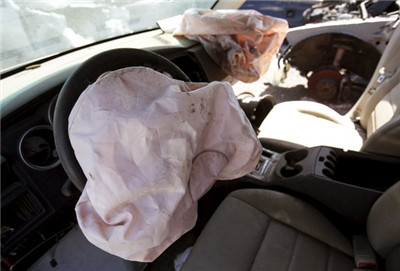(单词翻译:单击)
TOKYO — For the first time since a crisis erupted over deadly defects in airbags made by his family’s company, the reclusive chief executive of the Japanese supplier Takata publicly addressed the issue on Thursday. He offered an apology but defended Takata’s products as fundamentally safe.
东京——自从因家族企业制造的安全气囊被曝有致命缺陷的危机爆发以来,本周四,此前很少露面的日本高田公司总裁第一次公开回应此事。他对此致歉,但坚称高田的产品从根本上来说是安全的。
“I apologize from my heart to those who have died or been injured,” the chief executive, Shigehisa Takada, said after bowing deeply in a show of remorse. “I feel a heavy responsibility.”
“我向因此死亡或受伤的人表示由衷的歉意,”社长高田重久在表示悔恨地深鞠躬后说,“我感到责任非常沉重。”

Yet Mr. Takada, the 49-year-old grandson of the company’s founder, did not explain why he had remained all but absent during the crisis that has been at full boil for more than a year.
但是公司创始人的孙子,49岁的高田仍未解释他为何在危机持续的一年多时间里一直置身事外。
Even after Toyota and Nissan said on Thursday that they would recall 2.86 million more vehicles equipped with Takata airbags than first announced, Mr. Takada dismissed suggestions that he should resign over what has become the largest automobile safety recall in history. So far, about 35 million vehicles worldwide have been affected.
甚至在丰田和日产于周四宣布,将召回比第一次宣布时还要多286万辆的配备高田安全气囊的车辆之后,高田面对史上最大规模的一次因安全原因导致的汽车召回,仍然拒绝辞职。目前,全世界共有大约3500万辆汽车受到影响。
Takata admitted last month that faults in its airbags could cause their inflaters to explode with too much force when they deploy, endangering the drivers and passengers that the safety devices are intended to protect. At least eight deaths and 130 injuries have been linked to the defect.
高田公司于上个月承认安全气囊的缺陷可能导致增压泵因工作时的过大压力而爆炸,从而危及安全气囊原本应该保护的驾驶员和乘客。至少有八个死亡案例和130个受伤案例被认为与这一缺陷有关。
Mr. Takada shed little new light on the nature of the defects, and he acknowledged that Takata was making slow progress with its investigation. The company said it had identified manufacturing failures, which it says have since been resolved, as being responsible for faults in about 10 million airbag inflaters.
高田并未对缺陷的本质作出新的解释,同时承认高田公司的调查进展缓慢。公司声称已经确认了此前称已经解决的生产环节的故障,这些故障导致了大约1000万个安全气囊增压泵的缺陷。
Defects traced to the manufacturing problems, mainly careless handling of inflater components at two North American factories, were called “alpha cases” inside the company, Takata executives said on Thursday.
高田的经营主管人员于周四时说,可追溯到生产环节的缺陷在公司内部被称作“阿尔法案例”。这些生产问题主要是指北美两家工厂处理增压泵部件时的疏忽。
Questions still surround what the company calls “beta cases,” involving inflaters that were not subject to any known mishandling during production but that ruptured anyway. Prolonged exposure to heat and humidity is suspected to be a contributing factor to the failures, but Takata said it was still trying to pinpoint the exact cause or causes.
疑问仍围绕着被公司称为“贝塔案例”的情况,即部分增压泵在生产环节中未受到任何已知操作错误影响时仍然发生了破裂。长时间暴露在高温度和高湿度中被认为是导致故障的一个因素,但高田公司称仍在试图查明确切的原因。
Mr. Takada and other executives rejected the theory, put forward by some experts, that the basic design of Takata’s inflaters was dangerous because the company uses an explosive propellant, ammonium nitrate, that other airbag manufacturers have avoided because it is deemed potentially unstable.
高田和其他经营主管人员否认了部分专家提出的观点。这些专家认为高田公司的增压泵的基本设计就很危险,因为公司使用了爆炸性的推进剂——硝酸铵,这是其他安全气囊制造商因其潜在的不稳定性而避免使用的物质。
“We have been working with ammonium nitrate for more than 10 years, and have tested it in a variety of ways,” Mr. Takada said. “As far as I’m concerned, it is safe and reliable.”
“我们已经使用硝酸铵超过10年,并已通过多种方式进行了测试,”高田说,“我认为它是安全可靠的。”
One automaker, Fiat Chrysler, told the Senate Committee on Commerce, Science and Transportation that it would no longer use Takata inflaters in replacements for driver’s side airbags in its cars, citing Takata’s use of ammonium nitrate.
汽车制造商菲亚特克莱斯勒公司告知参议院商务、科学和运输委员会,因高田公司对硝酸铵的使用,公司将不会在更换驾驶员的侧安全气囊时使用高田公司的增压泵。


